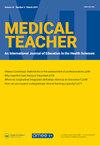开展公平的学术课外活动的12个建议。
IF 3.3
2区 教育学
Q1 EDUCATION, SCIENTIFIC DISCIPLINES
引用次数: 0
摘要
医学生经常参加一系列课外活动(ECA),包括研究项目、同伴教学和课程开发项目等学术活动。有研究报告称,学术性课外活动的益处包括:培养社交和领导技能;提高保留率;增强自信心;建立同伴关系;提高满意度;以及取得更大的研究生成功。然而,并非所有学生都能平等地利用这些机会。本文提出了十二条建议,以促进公平的学术 ECA 的发展。通过考虑所提供的建议,教师应该能够实施向所有感兴趣的学生开放的 ECA 机会。本文章由计算机程序翻译,如有差异,请以英文原文为准。
Twelve tips for developing equitable academic extracurricular activities.
Medical students often engage with a range of extracurricular activities (ECAs) including academic activities such as research projects, peer teaching and curriculum development projects. Studies have reported the benefits of academic ECAs including the development of social and leadership skills; higher retention rates; heightened self-confidence; peer bonding; improved satisfaction; and greater postgraduate success. However, not all students are equally positioned to take advantage of such opportunities. This paper presents twelve tips to facilitate the development of equitable academic ECAs. By considering the advice offered, faculty should be able to implement ECA opportunities that are open to all interested students.
求助全文
通过发布文献求助,成功后即可免费获取论文全文。
去求助
来源期刊

Medical Teacher
医学-卫生保健
CiteScore
7.80
自引率
8.50%
发文量
396
审稿时长
3-6 weeks
期刊介绍:
Medical Teacher provides accounts of new teaching methods, guidance on structuring courses and assessing achievement, and serves as a forum for communication between medical teachers and those involved in general education. In particular, the journal recognizes the problems teachers have in keeping up-to-date with the developments in educational methods that lead to more effective teaching and learning at a time when the content of the curriculum—from medical procedures to policy changes in health care provision—is also changing. The journal features reports of innovation and research in medical education, case studies, survey articles, practical guidelines, reviews of current literature and book reviews. All articles are peer reviewed.
 求助内容:
求助内容: 应助结果提醒方式:
应助结果提醒方式:


